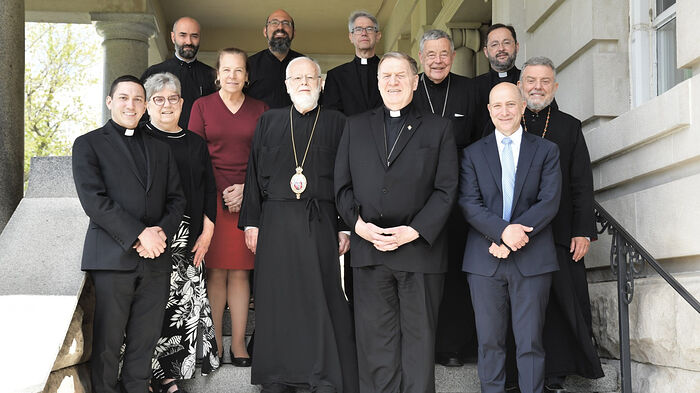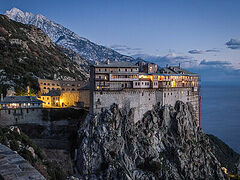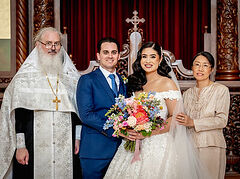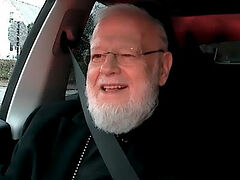New York, March 5, 2024
 The Orthodox-Catholic Consultation at its meeting in May 2023. Photo: assemblyofbishops.org
The Orthodox-Catholic Consultation at its meeting in May 2023. Photo: assemblyofbishops.org
The North American Orthodox-Catholic Theological Consultation has issued a new joint statement on the pastoral care of mixed marriages entitled, “Neither Yours Nor Mine—But Ours.”
The consultation is chaired, from the Orthodox side, by Metropolitan Methodios of the Greek Orthodox Metropolis of Boston, reports the Assembly of Canonical Orthodox Bishops, though the report does not name the other Orthodox members.
The Assembly report emphasizes that, “Like most dialogue-agreed statements, this document does not speak officially for either Church,” but has been drafted by theologians and is being circulated “for prayerful reflection and discussion.”
According to the statement, the Orthodox and Catholics “recogniz[e] the ecclesial reality of baptism in both Churches.”
After reviewing a number of past joint statements, the Theological Consultation “propose[s] that instead of dividing the parties in a mixed marriage into yours and mine, to adopt, as a starting principle, a joint solicitude for the spouses and embark on the pastoral care of each mixed marriage as our concern.”
The document explains that from the Catholic side, a mixed marriage celebrated in an Orthodox church is perfectly acceptable, while from the Orthodox side, a mixed marriage celebrated in a Catholic church is traditionally seen as an impediment to continued participation in the sacramental life of the Church for the Orthodox spouse.
Thus, the Consultation recommends that mixed marriages be celebrated in Orthodox churches.
However, despite the above recommendation, the Consultation also recommends that Orthodox hierarchs extend further economy to Orthodox Christians who get married in a Catholic church (in addition to the economy of permitting a mixed marriage, in contrast to the akrivia of Canon 72 of the ecumenically approved Council of Trullo):
We also recommend that Orthodox hierarchs consider the extension of ecclesiastical economy to Orthodox parties in legal contractual unions that have been established through the exchange of matrimonial consent and made with the intention of a lifelong bond in the Catholic liturgical and canonical tradition. Such an economy would be extended solely to the Orthodox spouse for the purpose of his or her canonical standing in the Orthodox Church, reflected in continued eucharistic participation and subsequent sacraments offered in the life of the Church such as the ability to serve as godparent at a baptism or sponsor at a wedding, and full participation in parish ministry life, including serving on the parish council, and so forth.
Regarding the religious upbringing of children in mixed marriages, the Consultation states that, “Parents should be unafraid to share the commonalities of their faith and be open and respectful where their faith diverges. Appreciation of diversity can provide a positive model for childhood development.”
Further, the theologians of the Consultation believe that pastoral care for children in such situations should be handled by both churches:
Nevertheless, membership in one church does not necessarily exclude some participation in the life of the other church. A child should be made aware of the faith traditions of both churches, even as the parents decide how to approach such an awareness together.
Ideally, both churches are jointly responsible for the pastoral care of spouses and children in mixed marriages. This responsibility must also be carried out in a spirit of love and mutual respect.
Traditionally, the Orthodox Church has expected that a mixed marriage be celebrated in the Orthodox church, with the spouses promising to raise any future children in the Orthodox Church.
At Council of Crete in the summer of 2016, which saw the participation of 10 Local Churches, a document on Marriage was adopted, which addressed the issue of mixed marriages.
The pre-conciliar version of the document from the Synaxis of the Primates held in Chambésy, Switzerland, in January 2016, stated:
Marriage between Orthodox and non-Orthodox Christians is forbidden and is not blessed in the Church, according to canonical akribeia (Canon 72 of the Quinisext Ecumenical Council). However, such a marriage can be blessed by dispensation and out of love, on the condition that the children born of this marriage will be baptized and raised within the Orthodox Church [emphasis added].
However, the final version, adopted at the Council of Crete itself, no longer includes any stipulations about children. It states:
Marriage between Orthodox and non-Orthodox Christians is forbidden according to canonical akribeia (Canon 72 of the Quinisext Ecumenical Council).
With the salvation of man as the goal, the possibility of the exercise of ecclesiastical oikonomia in relation to impediments to marriage must be considered by the Holy Synod of each autocephalous Orthodox Church according to the principles of the holy canons and in a spirit of pastoral discernment.
Follow OrthoChristian on Twitter, Vkontakte, Telegram, WhatsApp, MeWe, and Gab!



